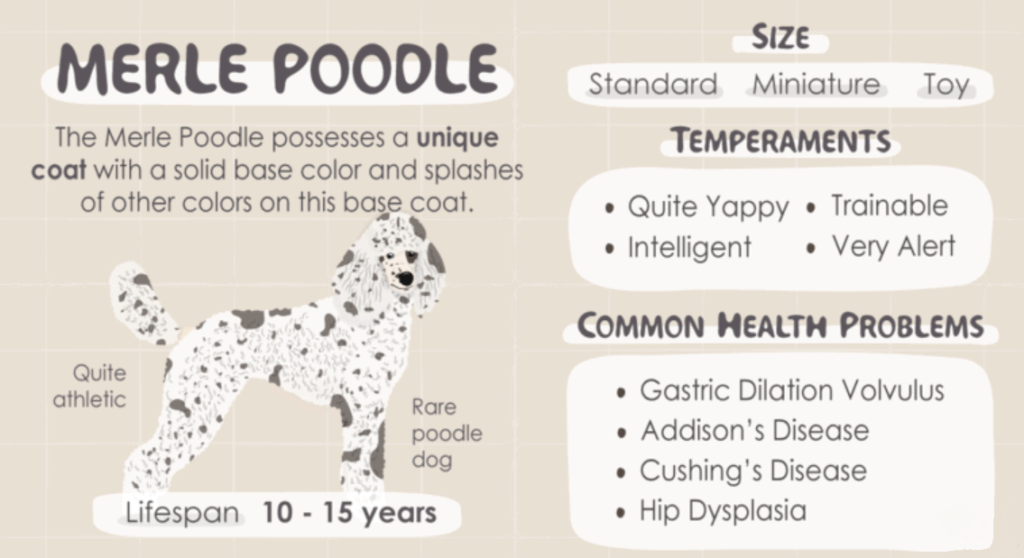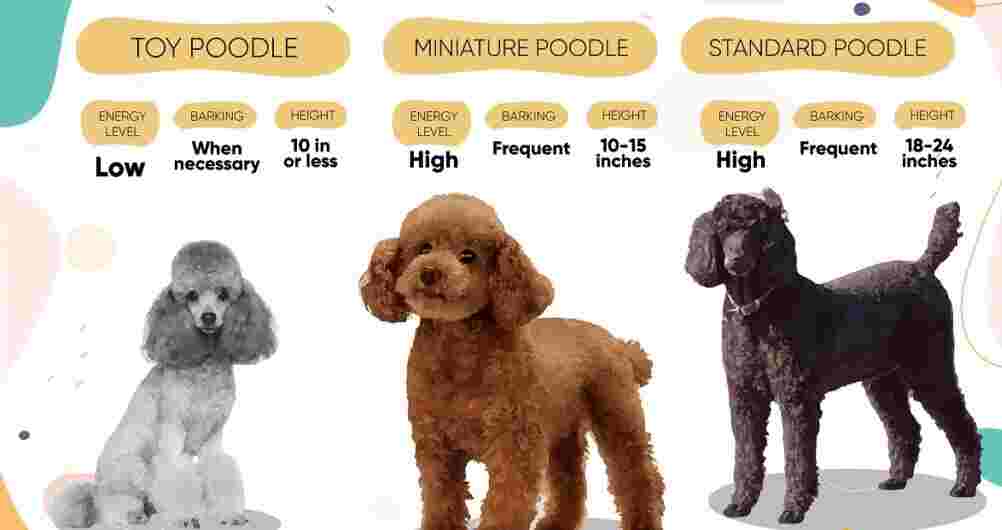Introduction:
Merle Poodles information : merle poodles are a stunning variation of the traditional Poodle breed, known for their distinctive coat patterns. These dogs not only capture attention with their striking appearance, but they also boast the intelligence and temperament that make Poodles such popular pets. In this article, we’ll dive deep into the world of Merle Poodles, exploring their unique characteristics, care requirements, and much more.
| Table of Contents |
|---|
| 1. What is a Merle Poodle? |
| 2. History and Origin of Merle Poodles |
| 3. Unique Coat Patterns of Merle Poodles |
| 4. Health Concerns in Merle Poodles |
| 5. Temperament and Behavior of Merle Poodles |
| 6. Grooming Requirements for Merle Poodles |
| 7. Exercise and Activity Needs for Merle Poodles |
| 8. Merle Poodles as Family Pets |
| 9. Training a Merle Poodle |
| 10. Where to Find a Merle Poodle? |
What is a Merle Poodle?
Merle Poodles are a variation of the standard Poodle breed with a unique and striking coat pattern caused by the merle gene. This gene creates patches of lighter colors mixed with darker base colors, giving the coat a mottled or “marbled” appearance. While Merle is a popular pattern in breeds like Australian Shepherds, its presence in Poodles is rare and has sparked both intrigue and controversy among dog enthusiasts.
History and Origin of Merle Poodles
The Merle gene does not naturally occur in purebred Poodles, which has led to much debate about its introduction into the breed. Some breeders have introduced the gene through crossbreeding, typically with breeds that naturally carry the merle gene, such as the Australian Shepherd. This has resulted in a mixed reaction from the Poodle community, with some celebrating the unique appearance, while others argue that it dilutes the breed standard. Despite the debate, Merle Poodles have gained popularity due to their eye-catching coats and signature Poodle qualities.
Unique Coat Patterns of Merle Poodles
Merle Poodles come in a variety of color patterns, including blue merle, chocolate merle, and red merle. The coat can have a mix of solid patches and speckled or mottled areas, making each Merle Poodle’s coat one-of-a-kind. The merle pattern can also affect the dog’s eye color, often resulting in blue or partially blue eyes, further adding to their distinctive appearance. It’s important to note that the merle gene can cause hearing and vision issues in some dogs, particularly if two merle-coated parents are bred together, so responsible breeding practices are crucial.

Health Concerns in Merle Poodles
While the merle pattern is beautiful, it comes with certain health risks. The merle gene is linked to a higher likelihood of certain health problems, including deafness and vision impairment. Double merles, which occur when two merle dogs are bred together, have an even higher risk of serious health issues such as blindness and severe hearing loss. This is why reputable breeders are cautious about breeding Merle Poodles and often recommend only breeding a merle dog with a non-merle to reduce these risks. Other common Poodle health concerns, such as hip dysplasia and progressive retinal atrophy (PRA), may also affect Merle Poodles.
Temperament and Behavior of Merle Poodles
Merle Poodles share the same traits as traditional Poodles: intelligence, loyalty, and an eagerness to please. They are highly trainable and enjoy mental stimulation, which makes them great companions for active families or individuals. Merle Poodles can be sensitive to their owners’ emotions, making them excellent therapy dogs or emotional support animals. Their playful nature and love of human interaction mean they thrive in homes where they receive plenty of attention.

Grooming Requirements for Merle Poodles
Poodles, including Merle Poodles, have a coat that requires regular grooming to keep it in top condition. Their curly, hypoallergenic coat can mat easily if not maintained, so regular brushing is essential. Many owners opt to take their Poodles to a professional groomer for regular trims, especially if they prefer a traditional Poodle cut. In addition to coat care, Merle Poodles require regular ear cleaning, nail trimming, and dental care to ensure their overall health and well-being.
Exercise and Activity Needs for Merle Poodles
Merle Poodles are energetic dogs that need daily exercise to stay healthy and happy. Whether it’s a long walk, playtime in the backyard, or even agility training, they thrive on activity. Due to their intelligence, Poodles also benefit from mental stimulation in the form of puzzle toys or interactive games. Without enough exercise and engagement, they may become bored and exhibit undesirable behaviors, such as chewing or excessive barking.
Merle Poodles as Family Pets
Merle Poodles make excellent family pets due to their friendly and loving nature. They are great with children and can adapt well to homes with other pets, provided they are properly socialized from an early age. Their hypoallergenic coat makes them a good choice for families with allergies. However, because they form strong bonds with their human companions, Merle Poodles can suffer from separation anxiety if left alone for long periods, so they do best in households where someone is often home.
Training a Merle Poodle
Training a Merle Poodle is typically a rewarding experience due to their intelligence and eagerness to please. Positive reinforcement methods work best, as they respond well to treats, praise, and playtime as rewards for good behavior. Early socialization and obedience training are important to ensure they grow into well-mannered adults. Many Merle Poodles excel in dog sports such as agility, obedience, and even therapy work, thanks to their trainability and natural athleticism.

Where to Find a Merle Poodle?
Finding a Merle Poodle requires careful research. Since Merle Poodles are not recognized by major kennel clubs like the AKC, it’s important to seek out reputable breeders who prioritize health and responsible breeding practices. Avoid purchasing from puppy mills or irresponsible breeders who may not take proper care of the dogs. Rescues and adoption organizations may occasionally have Merle Poodles or Poodle mixes, so checking with these groups is another potential option.
FAQs:
1. Are Merle Poodles hypoallergenic?
Yes, like other Poodles, Merle Poodles are considered hypoallergenic due to their curly, low-shedding coat.
2. Do Merle Poodles have more health problems than regular Poodles?
Merle Poodles may have a higher risk of certain health issues, such as vision and hearing problems, due to the merle gene.
3. Can Merle Poodles be registered with the AKC?
Merle Poodles are not recognized by the AKC, as the merle gene is not naturally found in Poodles.
4. How much exercise do Merle Poodles need?
Merle Poodles need daily exercise, including walks, playtime, and mental stimulation.
5. Are Merle Poodles good with children?
Yes, Merle Poodles are generally great with children and make excellent family pets.
6. How often should I groom my Merle Poodle?
Merle Poodles need regular grooming, including brushing several times a week and professional trims every 6-8 weeks.
7. Can two Merle Poodles be bred together?
Breeding two Merle Poodles is not recommended due to the high risk of serious health problems in the offspring.
8. Are Merle Poodles rare?
Yes, Merle Poodles are relatively rare compared to standard Poodles due to the unique merle coat pattern.
9. What size do Merle Poodles come in?
Merle Poodles come in all the same sizes as regular Poodles, including toy, miniature, and standard.
10. Do Merle Poodles require special training?
No, Merle Poodles can be trained like any other Poodle using positive reinforcement methods.
Conclusion:
In conclusion, Merle Poodles are a beautiful and unique variation of the Poodle breed, but their striking appearance comes with certain health risks that potential owners should be aware of. While they share the intelligence, loyalty, and loving nature of traditional Poodles, the merle gene presents challenges that require careful consideration, especially when it comes to breeding practices. With proper care, attention, and responsible breeding, Merle Poodles can make wonderful pets and lifelong companions. Whether you are drawn to their distinctive coat or their affectionate personality, these dogs offer a lot of joy to those willing to provide them with the love and care they need.


Pingback: Merle Poodles Stud Service : A Complete Guide - Merle Poodle
Pingback: Merle Poodles Health : Info pictures & Detail
Pingback: Merle Poodles Stud Service : A Complete Guide – My Blog